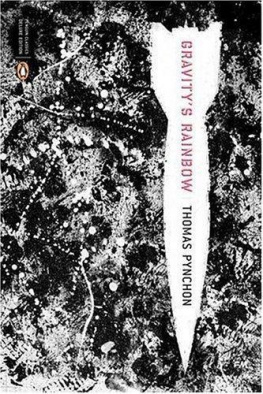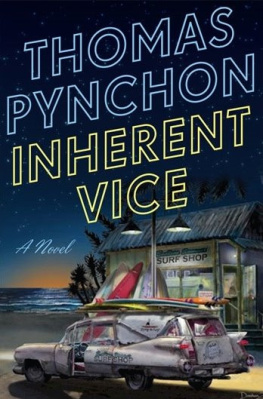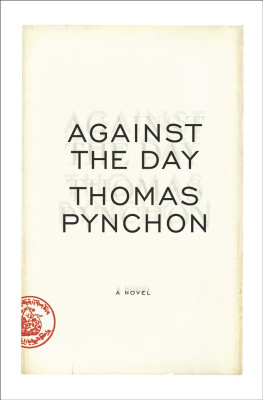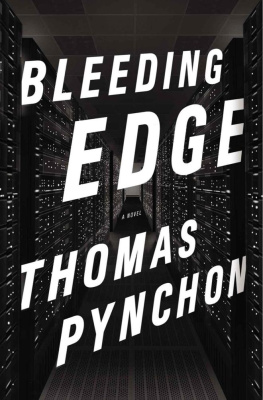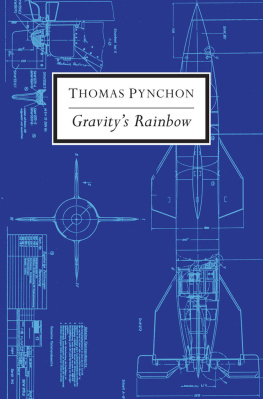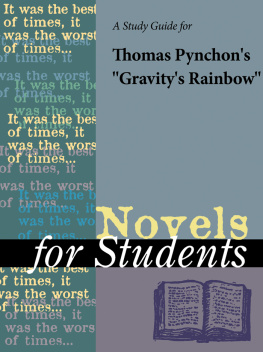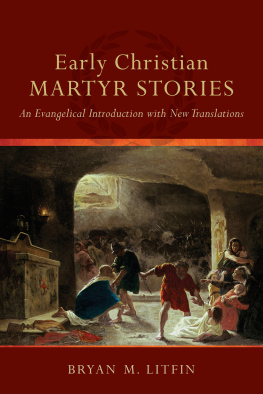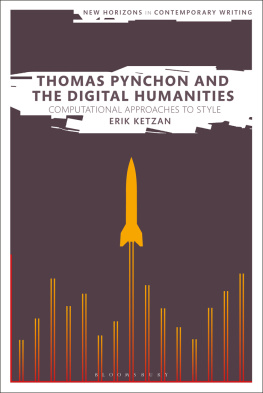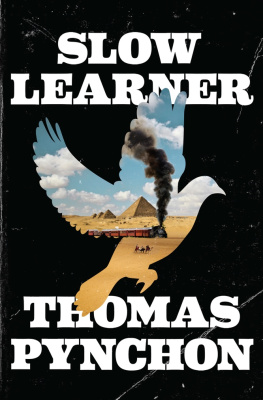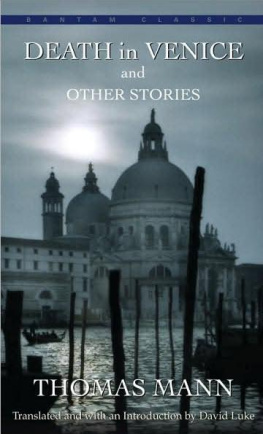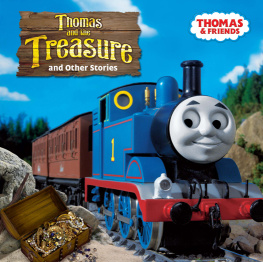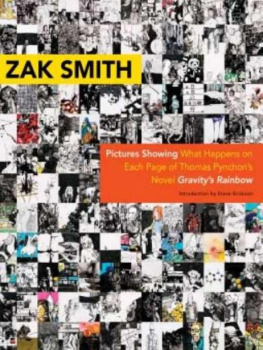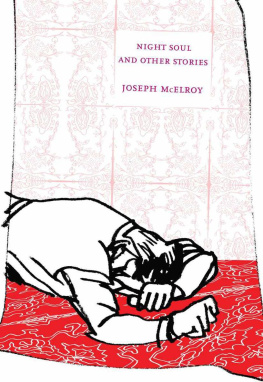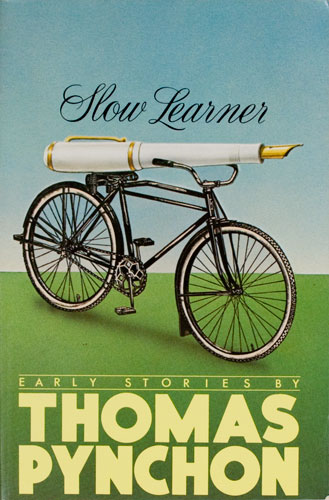
Slow Learner
Thomas Pynchon
INTRODUCTION
As NEARLY as I can remember, these stories were written between 1958 and 1964. Four of them I wrote when I was in college the fifth, "The Secret Integration" (1964), is more of a journeyman than an apprentice effort. You may already know what a blow to the ego it can be to have to read over anything you wrote 20 years ago, even cancelled checks. My first reaction, rereading these stories, was oh my God, accompanied by physical symptoms we shouldn't dwell upon. My second thought was about some kind of a wall-to-wall rewrite. These two impulses have given way to one of those episodes of middle-aged tranquility, in which I now pretend to have reached a level of clarity about the young writer I was back then. I mean I can't very well just 86 this guy from my life. On the other hand, if through some as yet undeveloped technology I were to run into him today, how comfortable would I feel about lending him money, or for that matter even stepping down the street to have a beer and talk over old times?
It is only fair to warn even the most kindly disposed of readers that there are some mighty tiresome passages here, juvenile and delinquent too. At the same time, my best hope is that, pretentious, goofy and ill-considered as they get now and then, these stories will still be of use with all their flaws intact, as illustrative of typical problems in entry-level fiction, and cautionary about some practices which younger writers might prefer to avoid.
"The Small Rain" was my first published story. A friend who'd been away in the army the same two years I'd been in the navy supplied the details. The hurricane really happened, and my friend's Signal Corps detachment had the mission described in the story. Most of what I dislike about my writing is present here in embryo, as well as in more advanced forms. I failed to recognize, just for openers, that the main character's problem was real and interesting enough to generate a story on its own. Apparently I felt I had to put on a whole extra overlay of rain images and references to "The Waste Land" and A Farewell to Arms. I was operating on the motto "Make it literary," a piece of bad advice I made up all by myself and then took.
Equally embarrassing is the case of Bad Ear to be found marring much of the dialogue, especially toward the end. My sense of regional accents in those days was primitive at best. I had noticed how in the military voices got homogenized into one basic American country voice. Italian street kids from New York started to sound like down-home folks after a while, sailors from Georgia came back off leave complaining that nobody could understand them because they talked like Yankees. Being from the North, what I was hearing as a "southern accent" was really this uniform service accent, and not much else.
I imagined I had heard oo for ow in civilian voices around Tidewater Virginia, but didn't know that in different areas of this real or civilian South, even in different parts of Virginia, people spoke in a wide number of quite different accents. It is an error also noticeable in movies of the time. My specific problem in the barroom scene is not only that I have a Louisiana girl talking in Tidewater diphthongs imperfectly heard to begin with, but worse, that I insist on making it an element of plot it makes a difference to Levine, and therefore to what happens in the story. My mistake being to try to show off my ear before I had one.
At the heart of the story, most crucial and worrisome, is the defective way in which my narrator, almost but not quite me, deals with the subject of death. When we speak of "seriousness" in fiction ultimately we are talking about an attitude toward death - how characters may act in its presence, for example, or how they handle it when it isn't so immediate. Everybody knows this, but the subject is hardly ever brought up with younger writers, possibly because given to anyone at the apprentice age, such advice is widely felt to be effort wasted. (I suspect one of the reasons that fantasy and science fiction appeal so much to younger readers is that, when the space and time have been altered to allow characters to travel easily anywhere through the continuum and thus escape physical dangers and timepiece inevitabilities, mortality is so seldom an issue.)
In "The Small Rain" characters are found dealing with death in pre-adult ways. They evade: they sleep late, they seek euphemisms. When they do mention death they try to make with the jokes. Worst of all, they hook it up with sex. You'll notice that toward the end of the story, some kind of sexual encounter appears to take place, though you'd never know it from the text. The language suddenly gets too fancy to read. Maybe this wasn't only my own adolescent nervousness about sex. I think, looking back, that there might have been a general nervousness in the whole college-age subculture. A tendency to self-censorship. It was also the era of Howl, Lolita, Tropic of Cancer, and all the excesses of law enforcement that such works provoked. Even the American soft-core pornography available in those days went to absurdly symbolic lengths to avoid describing sex. Today this all seems a dead issue, but back then it was a felt constraint on folks's writing.
What I find interesting about the story now is not so much the quaintness and puerility of attitude as the class angle. Whatever else the peacetime service is good for, it can provide an excellent introduction to the structure of society at large. It becomes evident even to a young mind that often unacknowledged divisions in civilian life find clear and immediate expression in the military distinction between "officers" and "men." One makes the amazing discovery that grown adults walking around with college educations, wearing khaki and brass and charged with heavy-duty responsibilities, can in fact be idiots. And that working-class white hats, while in theory capable of idiocy, are much more apt to display competence, courage, humanity, wisdom, and other virtues associated, by the educated classes, with themselves. Although cast in literary terms, Lardass Levine's conflict in this story is about where to put his loyalties. Being an unpolitical '50's student, I was unaware of this at the time - but in hindsight I think I was working out of a dilemma that most of us writing then had, in some way, to deal with.
At the simplest level, it had to do with language. We were encouraged from many directions Kerouac and the Beat writers, the diction of Saul Bellow in The Adventures of Augie March, emerging voices like those of Herbert Gold and Philip Roth - to see how at least two very distinct kinds of English could be allowed in fiction to coexist. Allowed! It was actually OK to write like this! Who knew? The effect was exciting, liberating, strongly positive. It was not a case of either/or, but an expansion of possibilities. I don't think we were consciously groping after any synthesis, although perhaps we should have been. The success of the "new left" later in the '6o's was to be limited by the failure of college kids and blue-collar workers to get together politically. One reason was the presence of real, invisible class force fields in the way of communication between the two groups.
The conflict in those days was, like most everything else, muted. In its literary version it shaped up as traditional vs. Beat fiction. Although far away, one of the theatres of action we kept hearing about was at the University of Chicago. There was a "Chicago School" of literary criticism, for example, which had a lot of people's attention and respect. At the same time, there had been a shakeup at the
Next page

